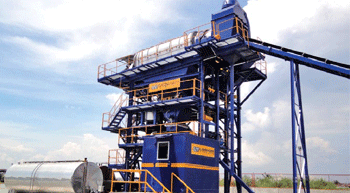
Recycling is the value proposition of today
Excerpts from the interview
What are the solutions offered by Linnhoff in hot/cold recycling?
In cold recycling, we provide plants wherein up to 30 per cent RAP can be directly used with the asphalt mix. In hot recycling, we offer plants where RAP can be used up to 70 per cent and warm-mix asphalt plants, which can save on energy. All these technologies provide carbon credits so that it is a win-win situation for all of us - the society, contractors and the suppliers.
Along with recycling, Linnhoff has also introduced 22 plants across India where coal is used as fuel instead of furnace oil and diesel. This helps in an overall saving of Rs 200 per tonne in fuel cost. Use of RAP helps in achieving an overall saving of Rs 400 per tonne if we use RAP up to 30 per cent in the asphalt mix.
What is the demand supply scenario?
Demand has to be created as the technology is relatively new. We have to educate the authorities and then the customers. The highway authorities are planning to come out with pilot projects of milling and recycling of certain roads and use RAP in laying new roads.
They have identified certain stretches in the total highway network in the country for this purpose. This is an awareness drive by the authorities as once these types of roads are being laid in India, more and more local players and authorities can be educated and attracted towards these projects.
What are the steps initiated by Linnhoff to address the issue availability of quality RAP?
We have come up with a solution by providing a complete sieving system which can separate the good and bad materials in the RAP. The bad material can be used in the non-value waste product while the good material can be used in the asphalt components to enhance its value.
Linnhoff has also introduced many new technologies in recycling. We offer plants for cold mix, warm mix and hot mix. In cold mix, up to 30 per cent RAP can be used, in hot mix the RAP content can go up to 70 per cent and in warm mix, the laying temperature of asphalt can bring down compared to hot mix, while keeping the same quality. Linnhoff has 8-10 cold mix plants, one hot mix plant and three warm mix plants operating across India.
What is your take on the existing specs?
The good news is that specs are in place now. It is the lack of awareness about using RAP technology. We have to educate the authorities and make them understand that this is a foolproof process. Authorities are concerned about the quality of the output. There is a feeling that use of recycled material will deteriorate the quality of the final product.
In fact, recycled material is better than existing material in certain cases. For example, the stone in the recycled material has been mined 10 years back, so it is much less weathered stone compared to the stone which is mined today. Also, the quality of RAP is ensured by doing all the required tests being done. So the RAP material is no way inferior to the new asphalt material.
How do you assess at the future scenario?
Future looks bright since the government is coming out with a lot of investments in road sector. Our experience in the recently concluded bC India was really encouraging as a lot of customers from across the country met us for road designs with these new technologies. Road network is increasing day by day, natural resources are depleting, and the raw material cost is going sky high.
So RAP is the only solution to sustain in the current situation. India has not yet come up in a big way currently in RAP technology. However, things look positive and in the coming few years, RAP will definitely lead the way.


 +91-22-24193000
+91-22-24193000 Subscriber@ASAPPinfoGlobal.com
Subscriber@ASAPPinfoGlobal.com